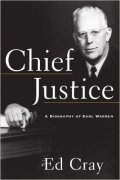
Reviewed by: James G. Apple, Editor-in-Chief, International
Judicial Monitor and President, International Judicial Academy
The editorial that appeared in the last issue of the International
Judicial Monitor (Spring 2015 – see Archive at the top of the Home Page)
discussed the background of persons being considered for judicial selection to
appellate courts in the United States. The thrust of the editorial was that the
background of such persons is important, and that efforts should be made for
diversity, not just racial and gender diversity, but diversity in education,
vocational and avocational experience, and social circumstances. Such
considerations are very important in populating the court systems of the United
States and other countries for the proper evaluation of many cases that come before the courts.
In support of this argument, illustrations were noted in the
editorial detailing the lives of some of the greatest jurists who occupied the
benches of courts in the United States, beginning with the establishment of the
judicial branch in the late 1990s. One example of a man who had no judicial
experience before he was appointed a judge and who became one of the great
justices of the Supreme Court of the United States, in fact, one of the great chief justices
is Earl Warren, a prosecutor, Attorney General, and then Governor of the State
of California. He was a product of a local law school – Boalt Hall (a part of
the University of California, Berkeley) instead of a prestigious “Ivy League”
law school, as many of the more recent Supreme Court Justices have been.
This excellent biography, written by a journalist rather
than a judge, lawyer or legal scholar, nevertheless captures the importance of
Earl Warren in American legal history, and enlightens the reader about why a
man of his background is worthy of note and examination when considering
backgrounds of those who are being considered for judicial selection. Ed Cray
writes in the Introduction:
A bluff, outgoing politician, he appealed to
millions – at the same time hiding a private, inner man revealed to only a
few. Not a legal scholar, he nonetheless led a legal revolution; his court
added enduring catch-phrases to the American vocabulary:
“Separate is not equal”;“One man, one vote”; Read him his rights.…”
In the judicial selection process in some places, academic
achievement is valued as a singular qualification for elevation to the bench.
Academic badges in college, such as Phi Beta Kappa and Dean’s List of
Distinguished Students are valued as indices for a successful judicial career.
In law school being selected for the particular law school’s law review and
being “tapped” for Order of the Coif, a society that limits its membership to
high academic standing, are similarly viewed favorably in the judicial selection
process. Earl Warren achieved none of those honors during his academic years.
The dean of his law school thought so poorly of his performance that he

 International
Judicial Monitor
International
Judicial Monitor